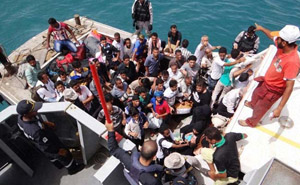Kochi, Apr 18: Two Navy-escorted passenger ships with 475 people, including Bangladesh nationals and Yemenese of Indian origin, evacuated from the conflict-hit Yemen arrived here today, bringing down the curtains on the massive rescue operation undertaken by the government.
"MV Kavaratti and MV Corals with 475 people reached Kochi to a rousing welcome by Naval and Cochi Port Trust officials in presence of Naval band," a Navy spokesman said.
This is the last Indian evacuation from Yemen by the sea route. The two ships had left Djibouti on April 12.
The passengers arrived here included 337 Bangladesh nationals and 65 Yemenese of Indian Origin.
Officials from Bangladesh government are in the town to co-ordinate onward travel of their fellow nationals.
However, it is not clear what stand the government would take on the 65 Yemenese of Indian origin, Kerala government officials here said.
India had launched a massive air and sea evacuation operation late last month to bring back its nationals stranded in Yemen. The air evacuation concluded on April 9 after more than 4,700 Indians and nearly 1,000 foreign nationals belonging 41 countries were brought home.
In addition, Indian naval vessels have also evacuated over 1,670 Indians from Aden, Al Hudaydah and Al Mukalla ports in Yemen since March 31.
The two passenger ships, among the first to be tasked for evacuation by the government, had left here on March 30 and reached Djibouti six days later with armed naval commandos and naval escort on board.
The ships were escorted by a naval warship INS Tir till Kochi harbour after which they would be led into their respective berths by Fast Interceptor Crafts (FIC) of the Southern Naval Command.
NORKA and the district administration in coordination with Railways are overseeing the arrangements for onward travel of the Indians arriving by the ships.





Comments
Add new comment